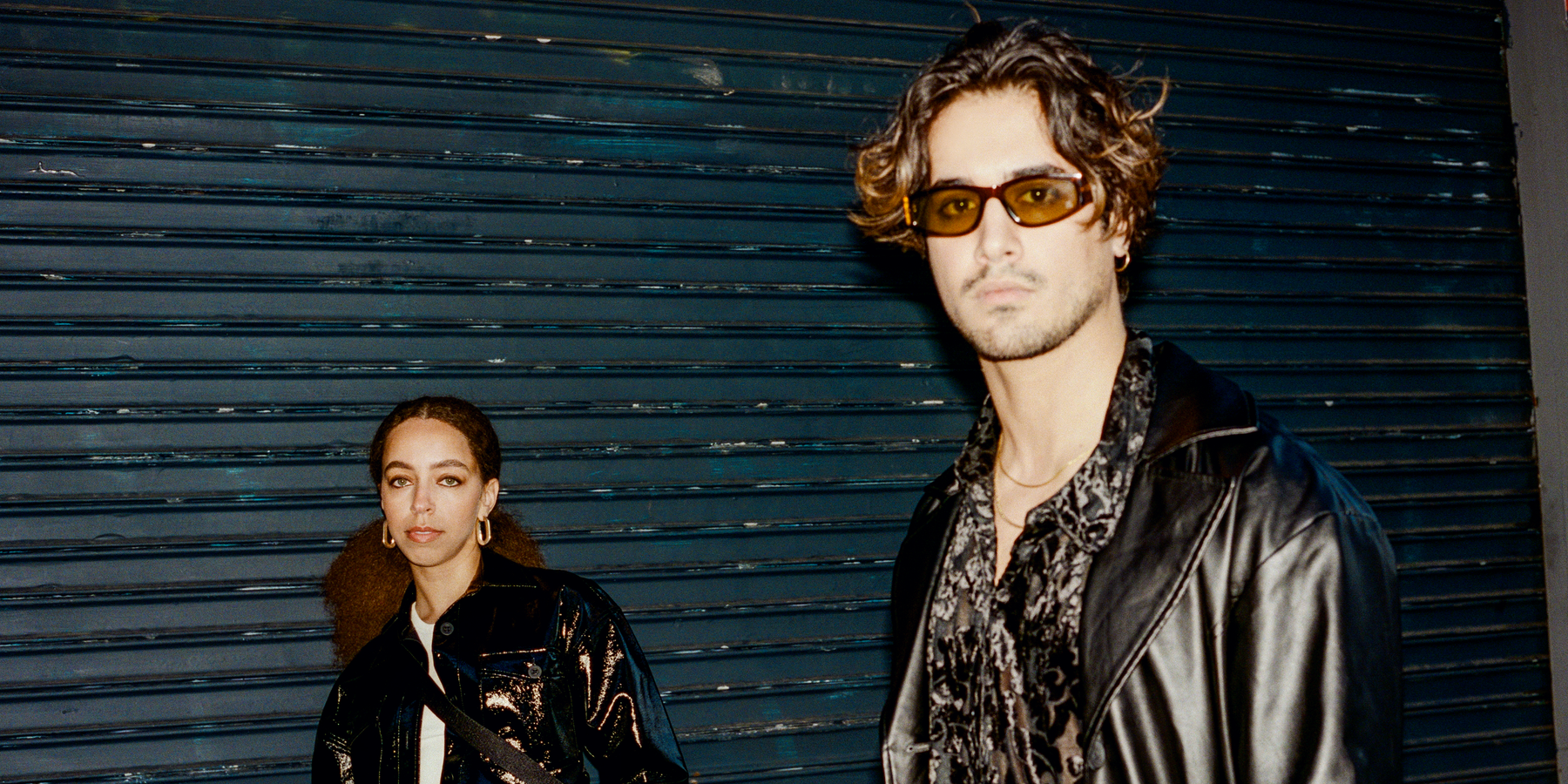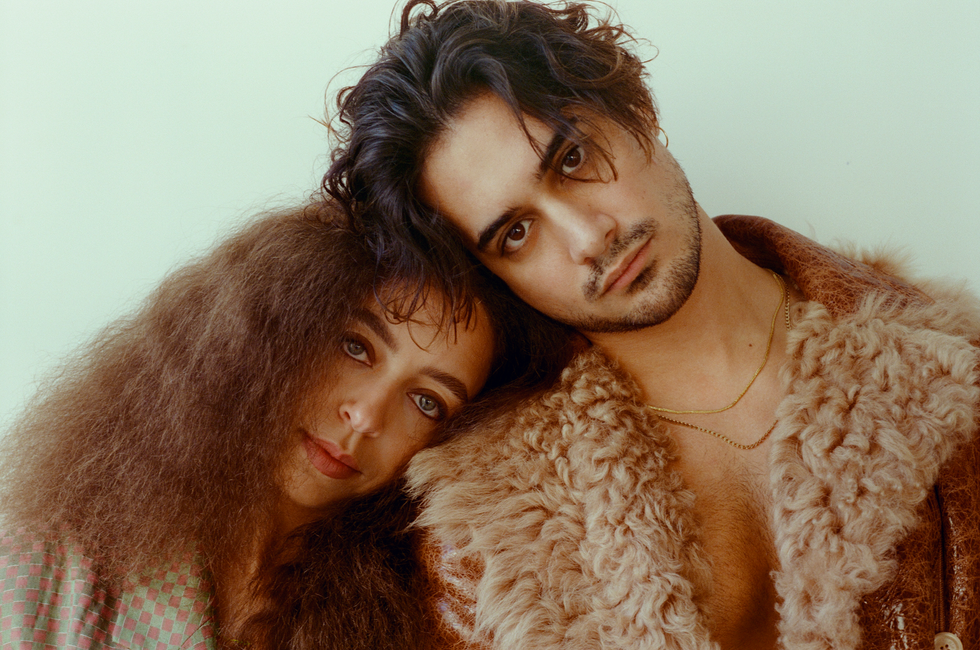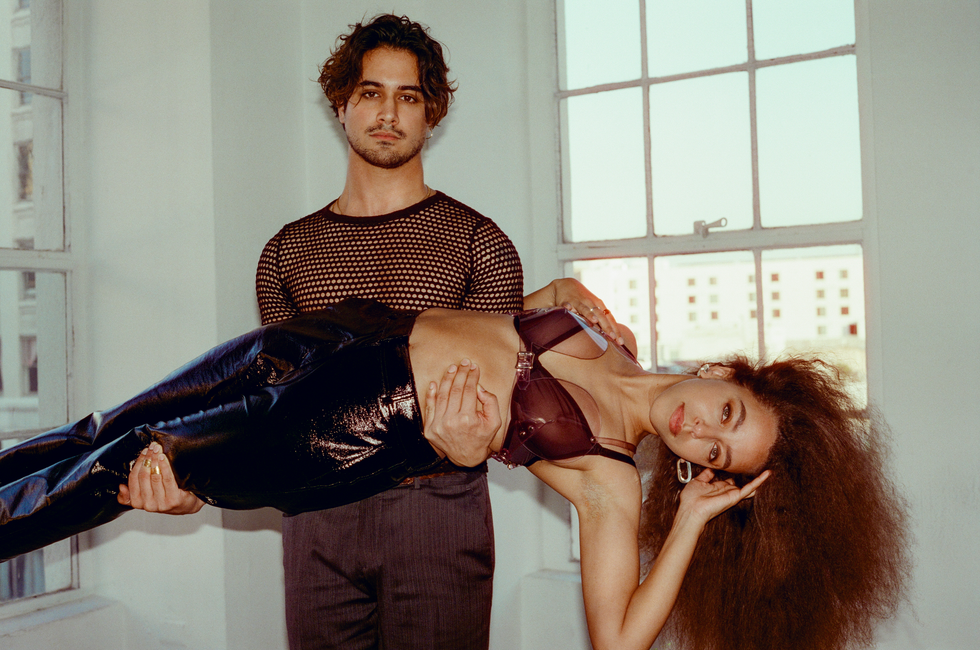
Avan Jogia and Hayley Law 'Glow in the Darkness' With 'Door Mouse'
Story by Sandra Song / Photography by Sam RamirezMay 19, 2023

The first time I heard about Avan Jogia’s directorial feature debut was during our interview for Playboy in 2019, where he described Door Mouse as an “electric, fun little punk-rock movie.” It would be a stylish neo-noir thriller, Jogia said at the time — a fast-paced and provocative indie film that wouldn’t be about yet another jaded, whiskey-guzzling P.I., but rather a jaded, whiskey-guzzling comic artist and burlesque dancer named Mouse.
Contrary to what her name may imply, Mouse is far from timid. She’s guarded and tough, with actress Hayley Law’s incredible performance adding an extra layer of complexity beneath our hero’s sharp one-liners and cool stoicism. But most importantly, she’s loyal and brave — the only person with the guts and gumption to start asking some hard questions that put her in a very dangerous situation.
Armed with Jogia’s script, Law turns Mouse into the antithesis of the “femme fatale,” her identity a second to her quest to find her coworkers. She’s a true vigilante who, in depressingly realistic fashion, is the only one alarmed by the sudden disappearance of her friends and actually decides to do something about it. And this is an act of defiance in and of itself.
Despite its surrealist editing and comic book-inspired interludes, Mouse’s world isn’t far from reality, where the white, rich and powerful are willing to do whatever it takes to satiate their desires. Because at its core, Door Mouse is a scathing critique of a capitalist society that exploits people of color, queer folks, sex workers and the poor — a phenomenon so ubiquitous that it even managed to bleed into the making of the film itself.
Read PAPER’s chat with Jogia and Law about Door Mouse, below.
Avan, we’re having a full-circle moment!
Avan Jogia: Yeah! I mean Door Mouse did take seven years to make.
Yeah, why was that?
Avan: The industry really only seems to respect a film about your identity. Like, if I wanted to make a film about being a mixed brown guy who wants to be an artist and then make up some shit about how my brown father doesn't want me to but my white mother does, I could get that movie made in 35 seconds. But the central reason they’re making that film is to commodify our bodies, and I refuse to do that. Ironically though, that’s [a big theme] of the movie, but I refuse to sell myself to a studio that way.
Hayley Law: I always feel like that too. I want to be like, “Let me just be in the movie and be Black. Don't make me being Black the movie.” So what I loved about this was that it was just me as Mouse, and Mouse could’ve been anyone. It wasn't about my struggle as a female and all that shit. It was just like real life.
When you go from doing big studio stuff to indies, it's a really special opportunity. You actually get to bring something to the table and give your own interpretation of it. Mouse gets to be who you want her to be, while some larger productions make you very cookie-cutter and tell you exactly what to do and what to say. Like, if you say “you’re” and it's in the script as “you are,” you have to redo it. But [with Door Mouse] we just had such freedom.
That’s amazing. So how did you prepare to play Mouse?
Hayley: The first time I read the script, I loved the character so much right away. She’s unapologetic about who she is and doesn't give two fucks about whether you like it or not, because I feel like that would be me if I could let go of all my own shit that gets in the way. I just feel like every single person would hope to have a Mouse if they were in that situation... like she’s a fucking cold, hard bitch but also has such a big heart.
So right away I was like, “I need to fucking be Mouse,” and I was putting Post-It notes on the script — just little tidbits about who the character was. I felt like she was growing as I was developing the script and kind of coming up with my own backstory about why she is the way she is or what happens after that final scene.

Yeah, I loved how Mouse was exactly what you’d expect a white dude in a neo-noir to be and that her identity isn’t the primary focus.
Avan: But you can also still have a conversation about the concept of a gender-flipped noir, because none of them have female leads. It's just not a thing. Like you said, it's always some grisly, 55-year-old white dude in a bar and, obviously, I love those movies. I wouldn't be making one otherwise. But I also wanted to see other people in that [sort of role], because people get diversity all fucked up, and it’s always like, “Let's make ‘diverse’ stories about ‘diverse' people's sadness.” And I wanted to see a noir like the ones we’ve been seeing for 100 years, just with different faces and bodies and looks.
You touched on this earlier, but it does feel like a lot of studio execs are currently trying to capitalize on larger conversations about representation and diversity, but only in a way that makes them money. That’s part of the reason you had to go indie, right?
Avan: Yeah. What people don't like is a new trick on the old dog… But I don't have to make films about my brownness in order to have a valid reason to make a film. It’s the harder road, but I just wanted to make a punk film with people of color as the central figures, because I feel like they’re always conveniently forgotten.
I do want to reiterate the budget level though. It was 1.2 million Canadian dollars for four years. We had to get money through a grant from Telefilm, which is an arm of the Canadian government.
We’re working with a budget that’s a song and dance. It was like giving us a bus token and being like, “Hey man, good luck. Hope you make this film.” And we’re filming during COVID pre-vaccine, so like 20% of that budget is COVID protocols, and if someone on the cast gets it — or someone in the tight group that needs to be out there every day — it just goes away.
Hayley: Luckily, though, we shot it in a town that was so fucking isolated. Not that the odds were low, but the town was in the middle of nowhere.
The fact you were basically given pennies to make this film is pretty ironic, you know, given its message about old white capitalists being the enemy of true artistic pursuit.
Hayley: We do have to have this huge discussion about how capitalism is proliferated by the white execs and how that kind of takes away your bodily autonomy, even if you’re a person of color quote-unquote making films from the perspective of a person of color. They’ll do it through not giving you adequate funding or telling you this won't market and shit like that.
Avan: I still just think it’s crazy I made a movie that’s not about my artistry as a person of color or art that has to match my appearance, and capitalism doesn't know what to do with me.
While doing that for what’s basically the same three movies starring the same three actors every single year.
Avan: That’s the other thing. That's the thing I hated about the script writing process, because as I started to pitch it to mainstream studios, they’re like, “Why does she care? What’s her backstory?” But Liam Neesom doesn’t need a reason. We don’t ask the Die Hard people these things. He just needs to stop those terrorists, right? But Mouse is the same. She just needs to stop this horrible act that's hurting people in her community.
Hayley: It’s really hard to think of a movie that is similar to Door Mouse in that way.

I don’t get why they don’t want to fund a fresh new take on this genre that’s already proven to be super marketable with shit like Sin City. Speaking of Sin City though, I also liked that Door Mouse was set up kind of like a graphic novel as well. What was behind that stylistic decision?
Avan: I wanted to create a different world. There's a lot of things that create distance in the film like the animation, the comic book and the stylization, because I don't want to smear people's faces with the [heavy topics] we talk about.
One of the highest compliments I got was from someone who reached out to me and was like, “As somebody who's been through this sort of trauma, this is the first film I was able to watch that didn't immediately make me want to turn it off.” And the film was a success to me based on that, because I didn’t want it to be sexually violent. The only violence that’s depicted is against bad guys.
That’s so sick. Honestly, I’d rather watch that over another biopic about a white male serial killer, especially since a lot of them also specifically targeted sex workers.
Avan: You know, the original idea for this movie was actually based on [something that happened] when I was growing up in Vancouver. I grew up in low-income housing, and it was well-known that indigenous women of color were going missing. And these were sex workers and people who were users, so the cops were just like, “That's just what happens to people like that.” But everyone in the community was like, “No, no, this is exceptional. This is crazy. It's a trend here. It's something that needs to be looked at.” And then it ended up being a serial killer.
But I also think when you're making a movie with that sort of subject matter, it can be exploitative and sensationalized, which I think is like the wrong way to go for me, personally. What I wanted to make was a movie that was punk rock and felt fun. Where you’d walk out like, “Fuck, I want to be those characters. I want to kill bad guys now.” I want people to just walk around with a little bit more power after watching it. And it can be just as satisfying as that other stuff. You still get your murder movie, but you make sure that the people being murdered aren’t very nice.
I guess I just love heroes, and I love people. There's always enough darkness in the world. I want to see somebody glow in the darkness. That's way more interesting to me.
Throughout May, PAPER will roll out our final projects under the most recent editorial team. These pieces continue pushing forward our mission to provide a platform for fresh talent and important stories too often overlooked. From the subjects to the creatives behind the images, our hope is for you to discover new things and be inspired by what you see. As always, thank you for showing up and being part of our community. –Justin Moran, Editor-in-Chief
Photography: Sam Ramirez